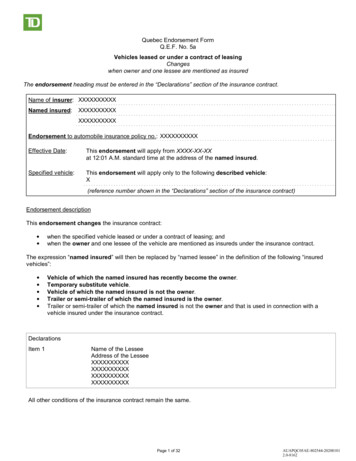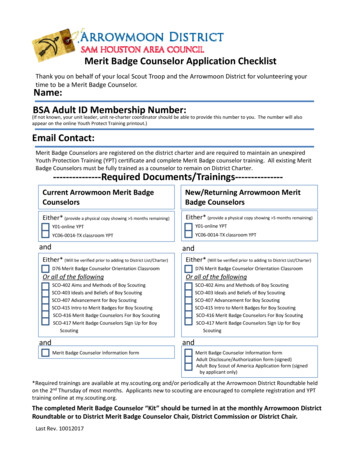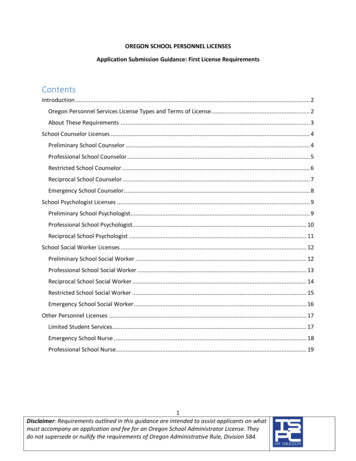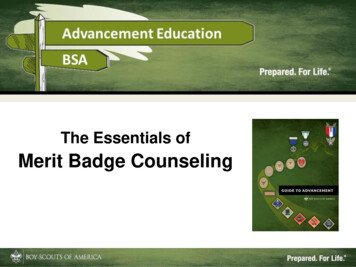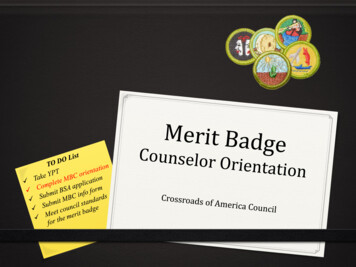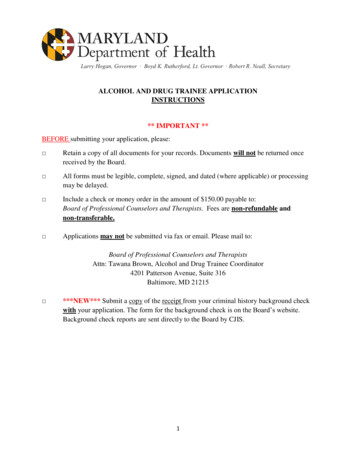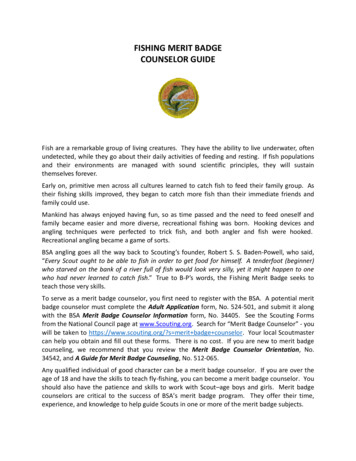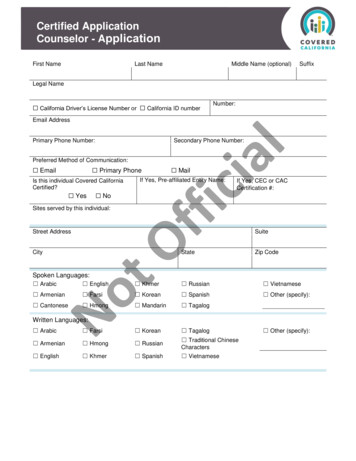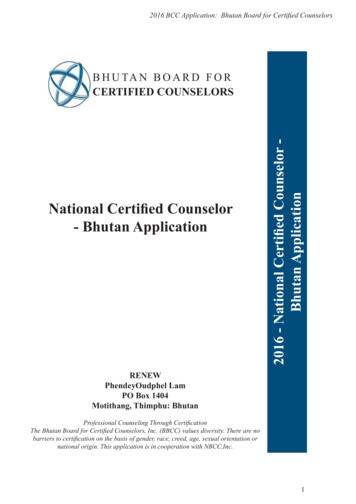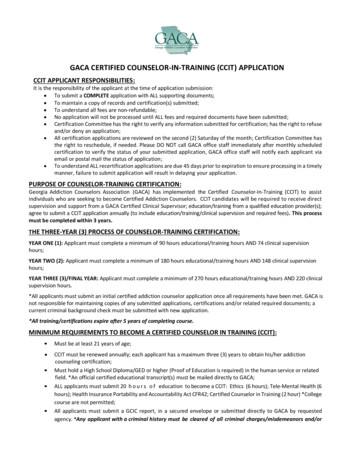
Transcription
GACA CERTIFIED COUNSELOR-IN-TRAINING (CCIT) APPLICATIONCCIT APPLICANT RESPONSIBILITIES:It is the responsibility of the applicant at the time of application submission: To submit a COMPLETE application with ALL supporting documents; To maintain a copy of records and certification(s) submitted; To understand all fees are non-refundable; No application will not be processed until ALL fees and required documents have been submitted; Certification Committee has the right to verify any information submitted for certification; has the right to refuseand/or deny an application; All certification applications are reviewed on the second (2) Saturday of the month; Certification Committee hasthe right to reschedule, if needed. Please DO NOT call GACA office staff immediately after monthly scheduledcertification to verify the status of your submitted application, GACA office staff will notify each applicant viaemail or postal mail the status of application; To understand ALL recertification applications are due 45 days prior to expiration to ensure processing in a timelymanner, failure to submit application will result in delaying your application.PURPOSE OF COUNSELOR-TRAINING CERTIFICATION:Georgia Addiction Counselors Association (GACA) has implemented the Certified Counselor-In-Training (CCIT) to assistindividuals who are seeking to become Certified Addiction Counselors. CCIT candidates will be required to receive directsupervision and support from a GACA Certified Clinical Supervisor; education/training from a qualified education provider(s);agree to submit a CCIT application annually (to include education/training/clinical supervision and required fees). This processmust be completed within 3 years.THE THREE-YEAR (3) PROCESS OF COUNSELOR-TRAINING CERTIFICATION:YEAR ONE (1): Applicant must complete a minimum of 90 hours educational/training hours AND 74 clinical supervisionhours;YEAR TWO (2): Applicant must complete a minimum of 180 hours educational/training hours AND 148 clinical supervisionhours;YEAR THREE (3)/FINAL YEAR: Applicant must complete a minimum of 270 hours educational/training hours AND 220 clinicalsupervision hours.*All applicants must submit an initial certified addiction counselor application once all requirements have been met. GACA isnot responsible for maintaining copies of any submitted applications, certifications and/or related required documents; acurrent criminal background check must be submitted with new application.*All training/certifications expire after 5 years of completing course.MINIMUM REQUIREMENTS TO BECOME A CERTIFIED COUNSELOR IN TRAINING (CCIT): Must be at least 21 years of age; CCIT must be renewed annually; each applicant has a maximum three (3) years to obtain his/her addictioncounseling certification;Must hold a High School Diploma/GED or higher (Proof of Education is required) in the human service or relatedfield. *An official certified educational transcript(s) must be mailed directly to GACA;ALL applicants must submit 20 h o u r s o f education to become a CCIT: Ethics (6 hours); Tele-Mental Health (6hours); Health Insurance Portability and Accountability Act CFR42; Certified Counselor in Training (2 hour) *Collegecourse are not permitted;All applicants must submit a GCIC report, in a secured envelope or submitted directly to GACA by requestedagency. *Any applicant with a criminal history must be cleared of all criminal charges/misdemeanors and/or
felonies/probation and parole requirements prior to applying for any GACA addiction certifications. Applicantmust submit a completion letter from his/her parole/probation officer at the time of application.ALL applicants must submit a signed contract identifying a Clinical Supervisor to provide supervision. ALL applicants are required to review the CAC initial application for certification requirements, failure to meetthese requirements may delay the certification process or result in denial of application.ALL applicants must read and sign the CCIT Receipt of Acknowledgment and submit to GACA. CCIT APPLICATION REQUIREMENTS:PART I:APPLICATION FEESThe initial CCIT non-refundable application fee is 67.50, this certification must be renewed annually. GACA will acceptchecks, money orders or VISA/MasterCard for payment of the fees. Non-sufficient Funds (NSF) – A fee of 35.00 or more willbe charged to any returned item(s) per transitions, this will include any/all additional bank and fees being charged to GACA.PART II:WORKSHEET FOR EVALUATING CCIT EDUCATIONAL CLOCK HOURSComplete the Worksheet for Evaluating CIT Certification Educational Clock Hours Form to see if you have met the 20 hours ofeducational requirements in the Eight (8) Counseling Skill Groups. Send in a copy of each training certificate to verify educationprovider, course, dates taken, and number of hours. Also send in a copy of your High School Diploma or GED if you have notattended college.PART III:CCIT ENDORSEMENT RECEIPT OF ACKNOWLEDGEMENTEach applicant will be responsible for reading the Code of Ethics, Oath and Assurance and the Eight Counselor Skill Groups.Upon reading these documents, the applicant must sign the CCIT Endorsement Receipt of Acknowledgment and submit toGACA.PART IV: CLINICAL SUPERVISION REQUIREMENTSEach applicant must be receiving clinical supervision by a GACA Certified Clinical Supervisor, who will be responsiblefor providing clinical supervision and the submission of the GACA Clinical Supervisor/Clinical Supervisor Change form.This will include any updates/changes to supervision status, ethical concerns and/or training issues.All applicants should meet with a supervisor to develop an initial supervision plan that includes specific training inthe Eight Counselor Skill Groups; applicant must meet with his/her clinical supervisor a minimum of four (4) hours amonth for individual supervision; applicant is also responsible for attending group supervision sessions.Each CCS/CIT should record supervision on the Counselor-In-Training Monthly Supervision Form.Applicant must receive a minimum of 220 hours of clinical supervision by a GACA CCS to become a GACA certifiedaddiction counselor.Applicant must submit a clinical supervisor contract annually, if there is a change in clinical supervisor status within10 days of change.Applicant must understand that receiving clinical supervision by a GACA CCS does not guarantee certification in thefield o addiction.PART IV:WORK SUPERVISOR REQUIREMENTSEach applicant must complete at least 4000 full time paid work hours under the direction of a person acceptable to GACA inthe practice of chemical dependency and abuse counseling. GACA approved work supervisor may be licensed or certified inone of the following areas: CCS, CACII, NCACII, CADCII, CAADC, LCSW, LMFT, LPC or other licensed behavioral health providersapproved by GACA.
GACA CAC EDUCATIONAL REQUIREMENT WORKSHEETEACH APPLICANT IS REQUIRED TO COMPLETE A MINIMUM OF FIFTEEN (15) TRAINING HOURS IN EACH OF THE EIGHT(8) COUNSELING SKILL GROUP AREASTREATMENT ADMISSION (SCREENING, INTAKE, ORIENTATION) The interaction with the clientto determine suitability for alcoholism and/or drug abuse treatment. Information necessary foradmission, appropriate assessment and appropriate treatment is collected; the client is orientedto the counseling process. Rules and expectations including financial responsibilities.MIN. REQUIREDHOURS15CLINICAL ASSESSMENT: To synthesize and interpret the data collected during the treatmentadmission in order to determine the client’s immediate problems, internal/external resourcesthat may facilitate or inhibit the treatment process. This assessment forms the basis for thetreatment goals and program established for the client.15ONGOING TREATMENT PLANNING: A specific, individualized treatment plan that addresses thetherapeutic needs of the client and places him/her in the appropriate placement on thecontinuum of care. The client’s strengths and weaknesses must be considered in settingpriorities for long and short-term goals and treatment. This plan must ultimately be formulatedwith the client15COUNSELING SERVICES: (Individual, Group, Family, Crisis Intervention, Client Education) Thisinteractive process assist clients by helping him/her change and maintain attitudes, beliefs andbehaviors that are more constructive. The counselor must determine the most appropriatetype of assistance and the counseling intervention to facilitate the change in behaviors,attitudes and beliefs. Counseling services included individual, family, group and crisisintervention counseling.15CASE MANAGEMENT/REFERRAL: This encompasses case consultation and interfacing withother agencies and professionals to provide the services needed by the client in order toachieve the treatment goals. Consultation and case review by a clinical supervisor are a vitalcomponent of managing the counseling process and providing quality care.15DOCUMENTATION - REPORT AND RECORD KEEPING: This encompasses maintaining andrecording the results of the treatment process accurately, descriptively and in a timely fashion.The legal document describes treatment including forms, releases, and consent forms andrecords.15DISCHARGE AND CONTINUM CARE: Discharge involves the reinforcement of the changedattitudes, beliefs and behaviors, assessment that there are no other pressing needs, followingup on the client’s status, making appropriate referrals for continuing services if necessary, andassessing the adequacy of support systems. Information on relapse prevention, continuationof self-help programs and other support mechanisms should be provided to the client as a partof the termination process.15LEGAL, ETHICAL AND PROFESSIONAL GROWTH: This skill group includes the federal and statelegislation governing the counselor/client relationship, adherence to the Code of Ethics thataddiction counselors are expected to follow in their practice and areas of continuing selfeducation and growth. The dynamic nature of the therapeutic process demands continual selfevaluation, monitoring and self-awareness.15
MIN. REQUIREDADDITIONAL TRAINING REQUIREMENTSHOURSETHICSExample: legal issues, client welfare, professional competence, development, supervision, therapeuticboundaries, financial issues, personal wellness, conduct relationship to other counselors and code of ethics,etc.6TELE-MENTAL HEALTH6CONFIDENTIALITY / HEALTH INSURANCE PORTABILITY AND ACCOUNTABILITY ACT CFR426PHARMACOLOGY15CULTURAL DIVERSITY15HIV / AIDS3CERTIFIED COUNSELOR IN TRAINING (CCIT) REQUIREMENTS (INITIAL APPLICATION ONLY)COUNSELOR IN TRAINING COURSE2ETHICS6TELE-MENTAL HEALTH6CONFIDENTIALITY / HEALTH INSURANCE PORTABILITY AND ACCOUNTABILITY ACT CFR426*Only one (1) course topic can be taken in a certification period270 REQUIRED EDUATIONHOURSGACA Providers (Face to Face educational training)Min. 54 hoursNAADAC Providers/Approved Providers – NAADAC provider number must be on printed on the certificate.COLLEGE: Course(s) have specific relevance to the field of addiction or counseling.(Core courses such as English, Science and Math cannot be counted toward certification)*College degrees must be in human service or related field AND must beMax. Allowed 90 hoursaccredited and listed on the Council for Higher Education Accreditation web site(www.chea.org); college course are not permitted for the recertification process.IN-SERVICE These hours must be directly related to counseling skills and/or knowledge neededto keep up to date in the field of addiction. (Defensive driving, CPR/FIRST AID/CPI, hand-washingtechniques, group session, 12-steps, films, video tapes, etc. cannot be counted as in-service hoursfor certification).Max. Allowed 20 hoursAddiction-specific internet/web-based/correspondence training/self-studyMax. Allowed 27 hoursWORK EXPERIENCE: Must be providing direct services to clients utilizing the eight (8)counseling skill groups in an agency or facility that is licensed to provide addictioncounseling.Min. 4000 hoursPLEASE NOTE: Completion of at least 4,000 hours of full-time paid experience under direction provided by a personacceptable to the association in the practice of chemical dependency and abuse counseling; Applicant Must be employedby an agency or facility that is licensed to provide addiction counseling.
CERTIFIED COUNSELOR IN TRAINING (CCIT) APPLICATIONProvide detailed information for all sections of this application. Print legibly or type. Incomplete or unsigned applications will be returnedto applicants for completion, causing delay or disqualification. Applications without payment will not be processed. A resume maybe attached but will not be accepted as a substitute for a completed application form.PLEASE PRINT CLEARLY /TYPE INFORMATION:NAME:Last NameCheck one:FirstInitialYear1Year2Year3Middle InitialMaiden Name, if applicableADDRESS:Street or PO BoxCONTACTCityStateDaytime Phone:ZipCountyCell Phone:E-mailPERSONALDate of Birth (must be over the age of 21)AGE:Last 4 Social Security #:XXX-XX-*It is the responsibility of the applicant to inform GACA and the Certification Committee in writing of any demographic changes, GACAis not held responsible of applicant does not inform the office of these changes; failure to do so may impact certification/re-certificationprocess and late fees will apply.(For statistical purposes only:MALEGENDER:MARITAL RACE:EDUCATION / DEGREES STATUS: Please check all that may applyHigh LLEGE: Course(s) have specific relevance to the field of addiction or counseling. (Core courses such as English, Scienceand Math cannot be counted toward certification) *Collegedegrees must be in human service or related field ANDmust be accredited and listed on the Council for Higher Education Accreditation web site (www.chea.org).LEGAL STATUS: All applicants must submit a GCIC report to GACA*(GCIC report must be submitted in a secured envelope or submitted directly to GACA by requested agency)Have you EVER been arrested, charged or convicted of any felonies or misdemeanors?Do you have any pending misdemeanor or felony charges?PLEASE READ:YESYESNONOAny applicant with a criminal history must be cleared of all criminal charges/misdemeanors and/or felonies/probation and parolerequirements prior to applying for any GACA addiction certifications. Applicant must submit a completion letter from his/herparole/probation officer at the time of application.If you answer yes to either question, please include a brief explanation for each reported criminal charge.
EMPLOYMENT INFORMATION:Applicant must hold/maintain position(s) providing direct services to clients utilizing the eight (8) counseling skill groups in an agencyor facility that is licensed to provide addiction counseling.Name of Employer:Your Job Title:Dates of Employment:Name and Title of Immediate Supervisor:Number of Hours per Week:Mailing Address of Employer:Telephone - include area code and/or extension:Primary Job Duties (Please include current job description issued by employer)Name of Employer:Your Job Title:Dates of Employment:Name and Title of Immediate Supervisor:Number of Hours per Week:Mailing Address of Employer:Telephone - include area code and/or extension:Primary Job Duties (Please include current job description issued by employer)I HEREBY AFFIRM, that ALL information submitted in this application is true and accurate, falsifying information will result in denial ofapplication and any future GACA certification applications.Applicants name (printed):Date:Applicants signature:DISCLAMERS and INSTRUCTIONSI hereby understand that by seeking any GACA certification it does not guarantee any employment options or opportunities. I willnot hold GACA, GACA clinical supervisor, officers, Committee members, employees and examiners liable for any lack of ability toobtain employment. The CIT certification does not guarantee certification as a CACI or CACII.Office use ONLYStaff Initials:Date Application Received:Fees Paid:Late Fees:
AFFIRMATION OF CODE OF ETHICSOn October 15, 2017, Georgia Addiction Counselors Association (GACA) adopted the NAADAC/NCC AP Code of Ethics that wasupdated and became effective October 9, 2016. The Code of Ethics sets nine principles that consider the clinician, supervisor, andrelevant others.The nine principles are: Principle I: The Counseling Relationship Principle II: Confidentiality and Privileged Communication Principle III: Professional Responsibilities and Workplace Standards Principle IV: Working in a Culturally Diverse World Principle V: Assessment, Evaluation and Interpretation Principle VI: E-Therapy, E-Supervision and Social Media Principle VII: Supervision and Consultation Principle VIII: Resolving Ethical Concerns Principle IX: Publication and CommunicationsThe GACA / NAADAC/NCC AP Code of Ethics provides direction and guidance to addiction counselors, education providers, serviceorganizations, regulatory boards, legislators, and other related parties. The GACA Code of Ethics is located athttp://gaca.org/about-gaca/gaca-code-ethics/. Ethics code violations may result in disciplinary actions, including loss of credential.I HEREBY AFFIRM, that I have read and understand all my professional obligations, duties, and responsibilities under all nine (9)principles and/or provision of the GACA / NAADAC/NCC AP Code of Ethics.Applicants name (printed):Applicants signature:Date:
GACA OATHSI HEREBY CERTIFY THAT ALL OF THE INFORMATION GIVEN HEREIN IS TRUE AND COMPLETE TO THE BEST OF MY KNOWLEDGEAND BELIEF. I ALSO AUTHORIZE ANY NECESSARY INVESTIGATIONS AND THE RELEASE OF MANUSCRIPTS AND OTHER PERSONALINFORMATION RELATIVE TO MY CERTIFICATION, (FALSIFICATION WILL NULIFY THIS APPLICATION AND MAY RESULT INREVOCATION OF ANY GACA CERTIFICATION).ASSURANCES AND RELEASEPLEASE NOTE: GACA reserves the right to request further information from all employers and other persons listed on theapplication form. The Certification Committee and its review committees reserve the option of requesting an oral interview withthe applicant. This information will be strictly used to evaluate the professional competence of the applicant as requested inorder to verify education, employment, etc. This information is not available to anyone outside this process without the writtenconsent of the applicant.“I give my permission for GACA and its staff to investigate my background as it relates to statements contained in this Applicationfor Certification. All information given herein is true and complete to the best of my knowledge and belief. I understand thatintentional false or misleading statements or intentional omissions shall result in denial or revocation of any GACA certification.”“I consent to the release of information contained in my application file and other pertinent data submitted to or collected byGACA to officers, members, and staff of the aforementioned Committee.”“I further agree to hold GACA, its officers, Committee members, employees and examiners free from any civil liability fordamages or complaints by reason of any action that is within the scope of the performance of their duties which they may takein connection with application and subsequent examinations, and/or the failure of GACA to issue certifications.”“By affixing my signature on receipt of acknowledgement, I certify my complete understanding of these statements and myintention to be fully bound thereby.”I HEREBY AFFIRM, that I have read and understand the components outlined in the GACA Oath, Assurance and Release.Applicants name (printed):Date:Applicants signature:I HEREBY AFFIRM, that I have received information related to the eight (8) counseling skill groups in this application, along withinformation related to the required clinical supervision, work experience and education requirements.Applicants name (printed):Applicants signature:Date:
CERTIFIED COUNSELOR IN TRAINING FEEALL FEES ARE NON-REFUNDABLE 67.50(annual renewal required)CCIT INITIAL APPLICATIONTOTAL AMOUNT DUE Make ALL check or money order payable toGeorgia Addiction Counselors Association*If renewal application is late, late fees will applyIf paying with debit/credit card, please complete the following information:XPrint name as it appears on cardCredit Card #:Expiration Date on Card / VIN# (last 3 digits on back of card)XPrint name as it appears on cardXCompany Name, if applicableCardholder Billing Address:Street:City, State, ZIP(Zip Code Required to Process Credit Card)APPLICATIONS SUBMITTED WITHOUT REQUIRED FEES WILL NOT BE PROCESSED OR REVIEWEDMail application, documentation and fees to:Georgia Addiction Counselors Association (GACA)4015 South Cobb Drive SE Suite 160, Smyrna, Georgia 30080
GACA CLINICAL SUPERVISOR / GACA CLINICAL SUPERVISOR CHANGE FORMProvide detailed information for all sections of this contract. Print legibly or type. Incomplete or unsigned contracts will not beprocessed, causing delay or disqualification. ALL CCS must hold a valid GACA CCS certification, please refer to GACA website forqualifications.CCS Status:Initial ApplicationTerminationPLEASE PRINT CLEARLY /TYPE INFORMATION:NAME:Last NameChangeCheck one:FirstInitialYear1Year2Middle InitialYear3Maiden Name, ifapplicableADDRESS:Street or PO BoxCONTACTCityStateDaytime Phone:ZipCountyCell Phone:E-mailPERSONALDate of Birth (must be over the age of 21)AGE:Last 4 Social Security #:XXX-XX-*It is the responsibility of the applicant to inform GACA and the Certification Committee in writing of any demographic changes, GACAis not held responsible of applicant does not inform the office of these changes; failure to do so may impact certification/recertification process and late fees will apply.EMPLOYEE INFORMATION:Applicant must hold/maintain position(s) providing direct services to clients utilizing the eight (8) counseling skill groups in anagency or facility that is licensed to provide addiction counseling.Name of Employer:Your Job Title:Dates of Employment:Name and Title of Immediate Supervisor:Number of Hours per Week:Mailing Address of Employer:Telephone - include area code and/or extension:Primary Job Duties (Please include current job description issued by employer)APPLICANTS SIGNATURE:Applicants name (printed):Date:Applicants signature:CLINICAL SUPERVISORS INFORMATION (PLEASE PRINT CLEARLY):I HERBY AFFIRM, I hold a valid GACA Certified Clinical Supervisor certification required by GACA to provide clinical supervision to GACA applicantsfor initial and re-certification purposes. By signing this application, I agree to provide clinical supervision to applicant in the eight (8) counselingskills group and assist applicant with the GACA application process.CCS Initials:Clinical Supervisors (First / Last) Name:Clinical Supervisor Signature:CCS Mailing Address:CCS Certification #CCS Expiration Date:Telephone - include area code and/or extension:
COUNSELOR-IN-TRAINING (CCIT) FUNCTIONS MONTHLY SUPERVISION FORMDocumentation of 220 hours of direct supervision is required by an approved GACA Certified Clinical Supervisor, a minimum offour (4) hours of individual clinical supervision is required monthly. This form must be completed by the clinical supervisor andsigned by the applicant.GROUP HOURS:INDIVIDUAL HOURS:(Min 4 hours monthly)EIGHT (8) COUNSELORSKILL GROUPSHOURS OF DIRECTFACE-TO- FACESUPERVISION(Must provide documented proof of groupattendance)HOURS OF MONTHLYWORK ACTIVITYACCUMULATIVE HOURSCOMPLETEDSCREENING, INTAKE,ORIENTATIONCLINICAL ASSESSMENTTREATMENT PLANNINGCOUNSELING SERVICESCASE MANAGMENTDOCUMENTATIONDISCHARGE / CONTINUING CARELEGAL, ETHICAL ANDPROFESSIONAL GROWTHOTHERAffidavit: I verify that the information documented above is true and accurate to the best of my knowledge and belief.CCIT SIGNATURE:Applicants name (printed):Date:Applicants signature:CCS SIGNATURE:Clinical Supervisors name (printed):Clinical Supervisors signature:Date:*CCS agrees to ensure all supervisees receive accurate documentationof supervision needed for the initial or re-certification process.
GEORGIA ADDICTION COUNSELORS ASSOCIATIONCERTIFIED COUNSELOR-IN-TRAINING (CCIT)THE EIGHT (8) COUNSELOR SKILL GROUPSThe GACA CCIT was created for candidates who are in process of certification as CACI or CACII to provide documentationto present to potential employers showing that they have met basic criteria and are seeking supervised clinical work hoursto meet requirements as a certified addiction counselor. In efforts to provide additional support to CCIT applicants, a quickreference of the Eight (8) Counselor Skill Groups is provided. (See below)I. TREATMENT ADMISSION (SCREENING, INTAKE, ORIENTATION)To interact with the clients to determine suitability for alcoholism and/or drug abuse treatment.Information necessary for admission, appropriate assessment and appropriate treatment is collected; theclient is oriented to the counseling process. Rules and expectations including financial responsibilitiesinclude:1. Evaluate psychological, social, and physiological signs and symptoms of alcohol and other drug use andabuse.2. Determine the client’s appropriateness for admission or referral.3. Determine the client’s eligibility for admission or referral.4. Identify any coexisting conditions (medical, psychiatric, physical, etc.) that indicate need foradditional professional assessment and/or services.5. Adhere to applicable laws, regulations and agency policies governing alcohol and other drug abuse services.6. Complete required documents for admission to the program.7. Complete required documents for program eligibility and appropriateness.8. Obtain appropriately signed consents when soliciting from or providing information tooutside sources to protect client confidentiality and rights.9. Provide an overview to the client by describing program goals and objectives for client care.10. Provide an overview to the client by describing program rules, and client obligations and rights.11. Provide an overview to the client of program operations.II. CLINICAL ASSESSMENTTo synthesize and interpret the data collected during the treatment admission in order to determine the client’simmediate problems, internal/external resources that may facilitate or inhibit the treatment process. Thisassessment forms the basis for the treatment goals and program established for the client1. Gather relevant history from client including but not limited to alcohol and other drug abuse,using appropriate interview techniques.2. Identify methods and procedures for obtaining corroborative information from significantsecondary sources regarding client’s alcohol and other drug abuse and psycho-social history.3. Identify appropriate assessment tools.4. Explain to the client the rationale for the use of assessment techniques in order to facilitate understanding.5. Develop a diagnostic evaluation of the client’s substance abuse and any coexisting conditions based onthe results of all assessments in order to provide an integrated approach to treatment planning based onthe client’s strengths, weaknesses, and identified problems and needs.III. ONGOING TREATMENT PLANNINGTo provide an addiction specific, individualized treatment plan that addresses the therapeutic needs of the clientand places him/her in the appropriate placement on the continuum of care. The client’s strengths and weaknessesmust be considered in setting priorities for long and short-term goals and treatment. This plan must ultimately beformulated with the client.1. Explain assessment results to client in an understandable manner.2. Identify and rank problems based on individual client needs in the written treatment plan.3. Formulate agreed upon immediate and long-term goals using behavioral terms in the written treatmentplan.4. Identify the treatment methods and resources to be utilized as appropriate for the individual client.
IV. COUNSELING SERVICES (Individual, Group, Family, Crisis Intervention, Client Education)The interactive process providing assistance to a client to help him/her change and maintain attitudes, beliefs andbehaviors that are more constructive. The counselor must determine the most appropriate type of assistance and thecounseling intervention to facilitate the change in behaviors, attitudes and beliefs. Counseling services includedindividual, family, group and crisis intervention counseling.1. Select the counseling theory or theories that apply.2. Apply technique(s) to assist the client, group, and/or family in exploring problems and ramifications.3. Apply technique(s) to assist the client, group, and/or family in examining the client’s behavior, attitudes,and/or feelings, if appropriate in the treatment setting.4. Individualize counseling in accordance with cultural, gender and lifestyle differences.5. Interact with the client in an appropriate therapeutic manner.6. Elicit solutions and decisions from the client.7. Implement the treatment plan.A. CRISIS INTERVENTION1. Recognize the elements of the client crisis.2. Implement an immediate course of action appropriate to the crisis.3. Enhance overall treatment by utilizing crisis events.B. CLIENT EDUCATION1. Present relevant alcohol and other drug use/abuse information to the client through formal and/orinformal processes.2. Present information about available alcohol and other drug services and resources.V. CASE MANAGEMENTThis encompasses case consultation and interfacing with other agencies and professionals to provide the servicesneeded by the client in order to achieve the treatment goals. Consultation and case review by a clinical supervisor is avital component of managing the counseling process and providing quality care.1. Coordinate services for client care.2. Explain the rationale of case management activities to the client.A. REFERRAL1. Identify need(s) and/or problem(s) that the agency and/or counselor cannot meet.2. Explain the rationale
certified counselor in training (ccit) requirements (initial application only) counselor in training course 2 ethics 6 tele-mental health 6 confidentiality / health insurance portability and accountability act cfr42 6 *only one (1) course topic can be taken in a certification period 270 required eduation hours

